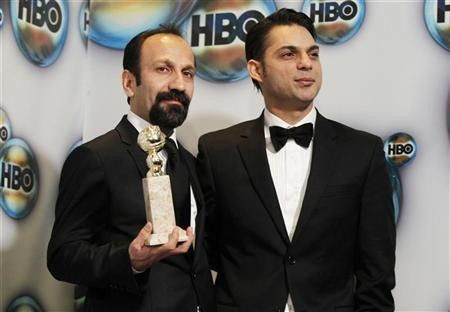Iran cautious over Golden Globe film A Separation

The Iranian government sounded a note of caution on Tuesday about the success of A Separation which won a Golden Globe for best foreign film, saying gritty realist films favored by critics showed a skewed version of the Islamic Republic.
While Iranian movie fans were thrilled to see director Asghar Farhadi receive the award from Madonna in a ceremony in Los Angeles on Sunday, the Tehran government, which keeps a tight control on movie output, has shown less enthusiasm.
You have always got to look at these festivals tactfully, Foreign Ministry spokesman Ramin Mehmanparast said when asked to comment on the movie which has also won the Berlin Film Festival's Golden Bear and is tipped for an Oscar.
Sometimes we see those who run these festivals grant precious awards to films whose main theme is centered on the poverty and hardships of a country's people.
This should not lead our artists to ignore the glaring positive points and features of our nation and instead illustrate the kind of things welcomed by such festivals' organizers.
The emotional story of a marriage break-up won over audiences with its natural dialogue and dramatic treatment of themes of loyalty, class and family, scoring 100 percent from critics on U.S. website Rotten Tomatoes and 94 percent from viewers.
The added exposure from U.S. awards juries comes as relations between the United States and Iran are severely strained, with Iran saying it could close a major oil shipping lane if new sanctions block its crude exports -- something that would likely lead to a military stand-off.
I just prefer to say something about my people. I think they are a truly peace-loving people, Farhadi said in an acceptance speech that pointedly lacked any overtly political message.
Avoiding the faux pas of Iran's best known film maker Abbas Kiarostami who was kissed by Catherine Deneuve when accepting the 1997 Palme d'Or at Cannes, Farhadi did not even shake hands with Madonna, conforming with Iranian law that bans contact between unmarried men and women.
PRIDE AND PREJUDICE
Javad Shamaghdari, Deputy Minister of Culture and Islamic Guidance of Iran, congratulated Farhadi for the win, saying his movie had overcome anti-Iranian prejudice. Wise judgment has put his movie on the podium of the chosen ones, he said in a statement carried by the ILNA news agency.
The movie's growing international profile is likely to renew concerns for film makers in Iran where scripts have to be submitted to Shamaghdari's ministry for approval and several high-profile directors have been arrested, jailed or banned.
Farhadi has in the past spoken up for Jafar Panahi, an award-winning director who was sentenced to jail in 2010 for security offences and banned from making films - putting himself in the line of fire from hardliners in the government.
In recent days, the government has closed the main Iranian film makers' association House of Cinema, a move criticized as political by the group's supporters.
Among the thousands of messages posted online by Iranians delighted by A Separation's win was one that said: I am so proud of you, it was a proud moment for all Iranians. With this event we have really upset those who closed the House of Cinema.
A YouTube posting of the award presentation carried the message: Too Bad this vid can't make it all the way over there, a reference to Iran's strict Internet censorship which clocks access to most western news sites.
Iranians can access banned sites like YouTube and Facebook by using VPN (virtual private network) software, but even that is something that may be put at risk by government plans to create its own version of the Internet in coming weeks or months that some people fear could further isolate the country.
Minister of Communications and Information Technology Reza Taqipour told Mehr news agency that Iran would not be disconnecting itself from the Web. This National Information Network will under no circumstances be a replacement for the Internet, he said.
© Copyright Thomson Reuters 2024. All rights reserved.





















